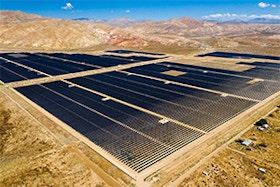
Mastering the integration of solar power plants with energy storage, plus other value-add solutions
Overview
A business-focused training course designed to provide business developers with an accessible and concise, yet comprehensive understanding into how advanced utility-scale solar power projects are providing greater value to the industry, its investors and energy system planners alike.
‘Dispatchable’ solar power projects are crucial to the scalability of solar within energy systems, increasing its ability to replace conventional thermal power capacity while maintaining power system flexibility and resilience. Compared to traditional solar-only projects, new considerations include the components required and the project design, development and integration processes involved. Understanding the market drivers and new revenue opportunities that such hybrid, multi-technology projects create are key to making the business case.
This course will lead attendees through the technologies, processes and financial return and risk considerations for those involved in dispatchable solar project development, with a particular focus on solar + storage. Explanations will be provided in clear, business-friendly language accessible to non-engineers. If you need a valuable, up-to-the-minute and independent introduction to these crucial trends in the future development of solar power projects, this online course provides a unique learning opportunity.
Course sessions
- Market trends and business cases driving ‘dispatchable’ solar power
- Integrating utility-scale solar power with battery storage
- Hybrid projects, hydrogen integration and other solutions to dispatchable solar power
- Economic variables and sizing of solar + storage projects
Among the key points to be answered
- What are the market factors driving integrated solar + storage projects?
- How can the addition of storage and other flexibility solutions create new revenue opportunities?
- Which other technology integration trends are emerging, including hybridisation & hydrogen?
- How are competitive tenders and utility & regulatory requirements driving dispatchable solar?
- What do examples from around the world indicate about changing market environments?
- What are the key considerations around plant design, components and grid connectivity?
- How do economic & financial aspects of solar with/without storage compare?
- How does solar resource assessment data feed into project design, sizing and site selection?
- How much storage or flexible capacity is needed, and which technologies are most appropriate?
Testimonials
“We learn something new everyday, even after 5-6 years in the renewable energy industry. I personally found Infocus training on Dispatchable and Flexible Solar Power very resourceful with a deep dive in energy markets, market value erosion & cannibalisation, Levelised Cost of Storage calculation and methods to integrate (various) energy systems to meet future demand for electricity. Thank you for the amazing training.” - Asset Manager, InfraCo Africa
“Highly accomplished trainer with a broad knowledge and the right mix between slides and exercises.” - Director, Crédit Agricole CIB
“One of my best spent weeks on training all year! I found him very knowledgeable and enthusiastic in presenting the material, also enabling knowledge exchange between participants in the group.” - Vice President, Statkraft Development AS
“In the past couple of months, I have attended several of his webinars which never failed to impress.” - Business Advisor & Project Development, Sokasolutions
Sponsor/exhibitor contact
Reanne Lee
[javascript protected email address]
Publish your content with EB Publishing
It's about who you reach. Get your news, events, jobs and thought leadership seen by those who matter to you.











